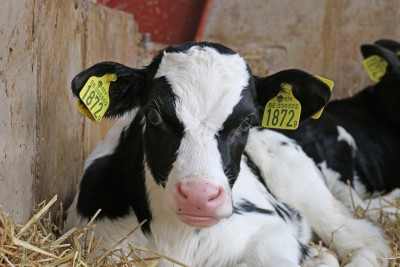Achieving a better price for you beef or dairy feeder cattle, Dr. Michael Baker

Achieving a better price for you beef or dairy feeder cattle, by Dr. Michael Baker
NNYADP Dairy-Beef Research: How to Add Value to Dairy Business
Northern New York. Dairy farmers may have an opportunity to add income through enhancing their breeding bull selection. Research funded by the farmer-driven Northern New York Agricultural Development Program (NNYADP) provides information to help dairy farmers decide if adding a crossbreeding enterprise for beef production would be a good addition for their dairy business.
Cornell University Beef Extension Specialist Dr. Mike Baker notes that according to the USDA Market News, in New York, Holstein-beef crossbred bull calves can bring up to a $100 per head premium compared to purebred Holstein bull calves, however, the majority of these calves born in New York are raised outside New York.
"Given the abundant supply of high-quality forage in Northern New York, producers have the potential to raise calves to feeder weights of 300 to 800 lbs. or to finish them using feed refusals from their dairy enterprise," Baker says. "This can provide an additional income stream for dairies as well as a supply of calves for the burgeoning beef stocker industry."
Baker notes that market competition will increase when the type of calves arriving at auction are segregated. The result?
"Calves with a vetted sire selection and raised with birth, health and nutrition protocols are bringing the highest premiums according to one semen supplier and livestock auction owner. Those with no sire selection are bringing smaller premiums," Baker explains.
The NNYADP research describes how using Expected Progeny Differences (EPD) data points can help dairy farmers make a good-fit beef breed bull selection for their milk cows.
"Holstein cows should be bred to beef sires whose traits complement the cows' genetic makeup, are economically-competitive to feed, and meet consumer demands for beef quality," Baker summarizes.
He adds that other considerations for bull section, based on studying EPD data points, are traits that indicated the opportunity for good average daily weight gain and ribeye quality.
Four farms in Northern New York assisted this NNYADP project; data was collected on 125 calves born to Holstein cows bred to an Angus beef breed bull. The New York State Department of Agriculture and Markets provided additional funding to support USDA grading of 100 calves to develop economic value data.
Funding for the Northern New York Agricultural Development Program is supported by the New York State Legislature and administered by the New York State Department of Agriculture and Markets. For more information, see www.nnyagdev.org.
For additional results, the full report is available online.
MEDIA CONTACTS:
- Project leader Dr. Mike Baker, Cornell University, 607-255-5923, mjb28@cornell.edu
- NNYADP Co-Chairs: Jon Greenwood, 315-386-3231; Joe Giroux, 518-563-7523; Jon Rulfs, 518-572-1960
- NNYADP Coordinator Michele Ledoux, 315-376-5270, mel14@cornell.edu
- Publicist Kara Lynn Dunn, 315-465-7578, karalynn@gisco.net
Upcoming Events
Deerworm and Flukes in Small Ruminants Webinar
February 25, 2026 : Deerworm and Flukes in Small Ruminants Webinar
Dr. Mary Smith from Cornell's College of Veterinary Medicine and Dr. Rachel White from UMaine Cooperative Extension will be discussing the lifecycles, signs, prevention, and management of deerworm and liver flukes in small ruminants.
NYSDEC How to Get Certified Course
March 3, 2026 : NYSDEC How to Get Certified Course
Ellicottville, NY
NYSDEC training course in preparation to take the pesticide applicator exam.
From Data to Dollars: Making Data-driven Decisions to Increase Farmers Market Success
March 3, 2026
The Cornell Agricultural Marketing Research Program and Penn State University are excited to present this new, 6-week course as part of Cornell's Farmers Market Research Project. The course is for farmers with experience selling at farmers markets who wish to increase their earnings through management and marketing practices.
Announcements
Cows, Crops & Critters Newsletter Sponsorship
TRYING TO REACH GROWERS AND AGRIBUSINESSES IN OUR SOUTHWEST REGION OF NEW YORK?Weekly Email Update: Shared with 625+ households who have signed up with our program.
Monthly Paper Mailer: To reach our stakeholders and farmers who lack internet access, we send out a monthly mailer where your company's logo and contact information would be featured with a mailing list of 330+ households.
If you sponsor our weekly and monthly publications you reach approximately 955 households.





